#jtjttw submission
Text
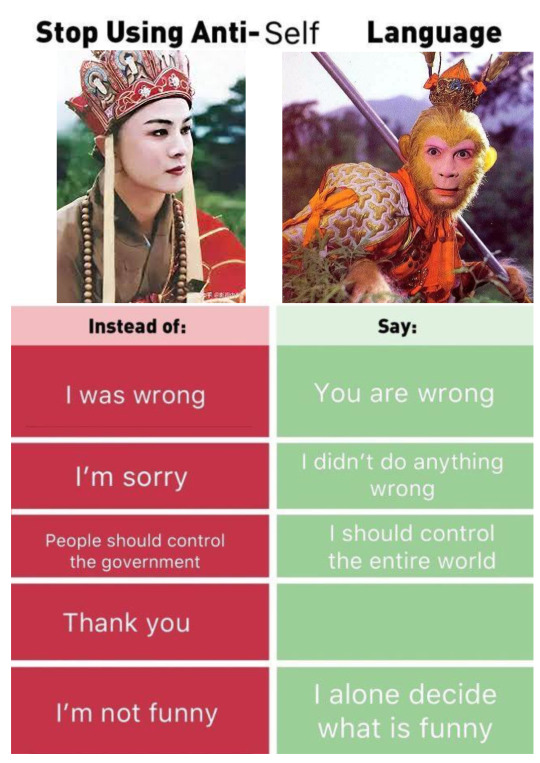
Just a quick meme to celebrate reaching Chapter 14 and the first time Tang Sanzang and Sun Wukong meet and subsequently fight. It truly is the meeting of the (monkey) minds, isn't it?
#jtjttw submission#xiyouji#journey to the west#jttw#jttw reading group#jttw book club#sun wukong#monkey king#tang sanzang#tripitaka#now obviously their characters are a lot more complicated than this#but still
247 notes
·
View notes
Text
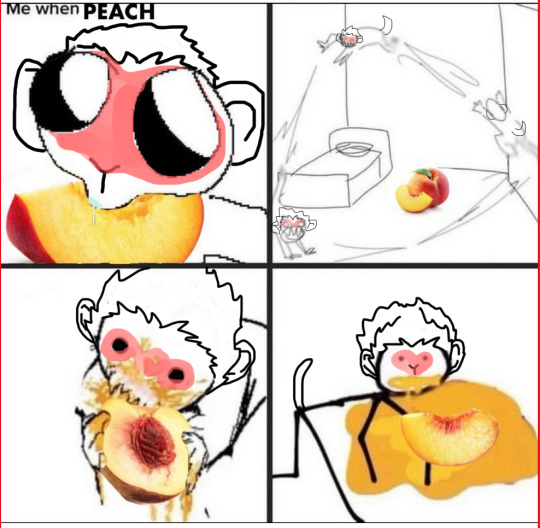
A hastily altered meme in honor of the reading group reaching Chapter 5.
#jtjttw submission#journey to the west#xiyouji#jttw#sun wukong#monkey king#jttw book club#jttw reading group#king loves his peaches
266 notes
·
View notes
Text
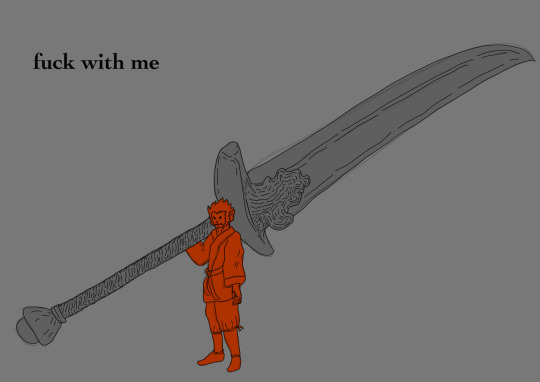
Sketchy sketch of everyone's favorite monkey before he got his iconic cudgel. Pretty wild to think he spent his early years as a yaoguai warlord dragging around a gigantic scimitar!
169 notes
·
View notes
Text
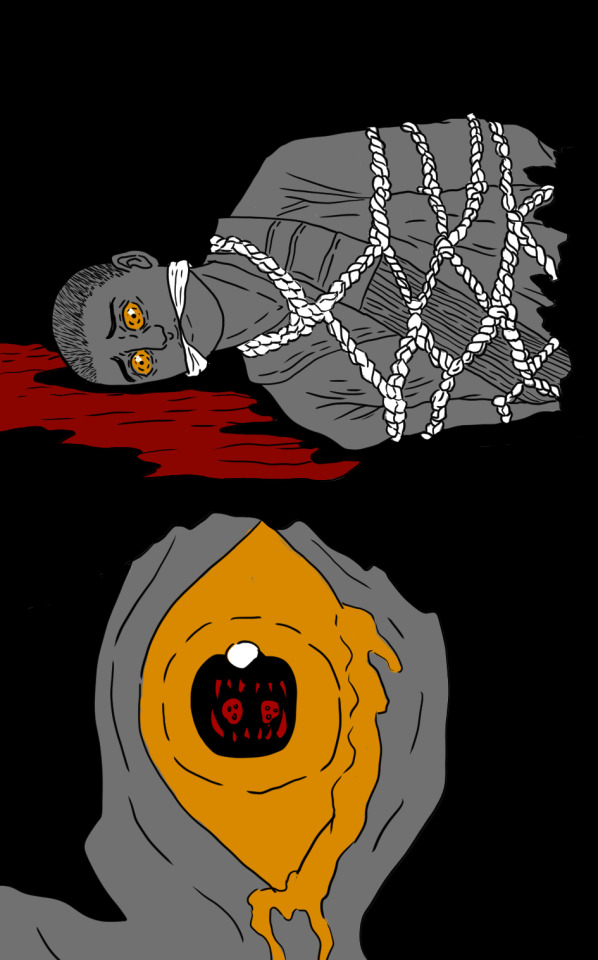
It's his trial and he'll cry if he wants to.
You would cry too if it happened to you.
---
Just a little tribute to Chapter 13's first trial of Tang Sanzang, in which we have the monk's first capture by yaoguai and the death by devouring of his two companions. Honestly, given everything that this monk already has and will suffer--and for as much flack as people give him for being a crybaby--considering everything it's a wonder he didn't cry more.
73 notes
·
View notes
Text
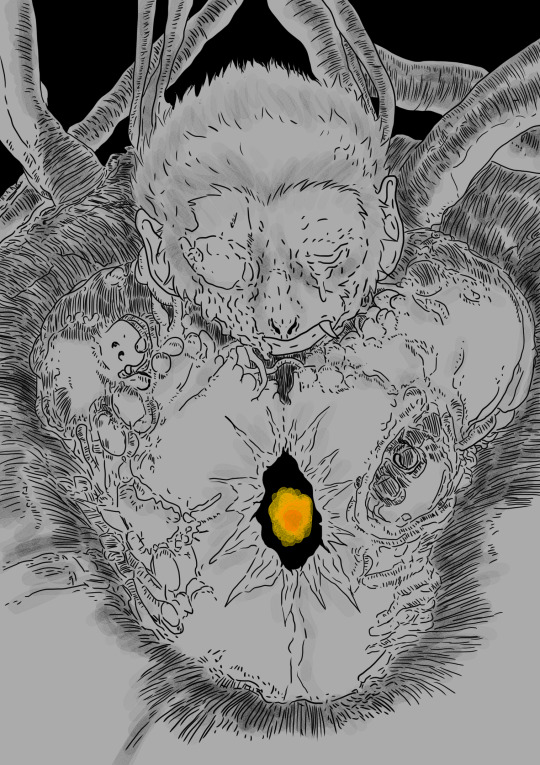
In the roots of the mountain
---
Digital sketch of our favorite Monkey King some centuries into his time under Five Elements Mountain. Quite the throwback for this reading group!
#journey to the west#xiyouji#jttw#sun wukong#monkey king#jtjttw submission#jttw book club#jttw reading group#it's a sketch i've been working on on and off for awhile#but also wanted to do it to remind everyone that they should feel free#to submit anything they want relating to chapters that we've already covered
25 notes
·
View notes
Text
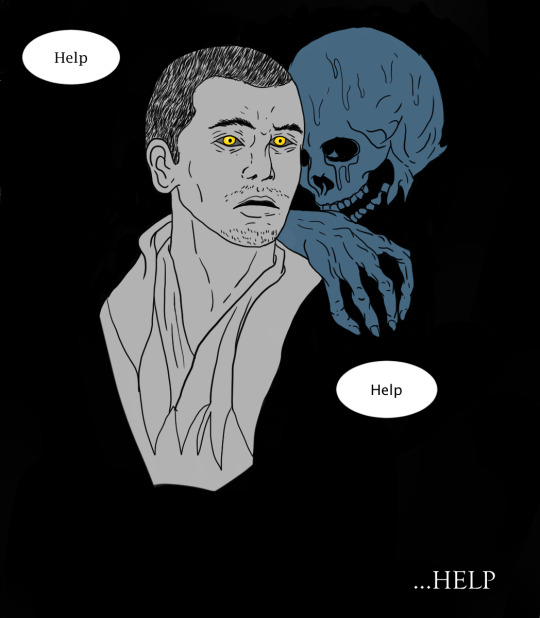
Here's to Tang Sanzang's ghostly adventure!
#jtjttw submission#jttw#xiyouji#journey to the west#tang sanzang#jttw reading group#jttw book club#tripitaka
22 notes
·
View notes
Text
The Original Location of the Ruyi Jingu Bang Has an Actual Geologic Site!
In a delightful coincidence given that we just finished Chapter 3 of Xiyouji for this book club, I happened to stumble across the fact that there is an area in the world which local people--in particular fishermen--believe to be the spot where Sun Wukong found (and stole) his golden cudgel. This is the Dragon Hole, the world’s deepest underwater sinkhole at just over 980 ft, located on a reef in the South China Sea. Blue holes are sinkholes that form through erosional processes in blocks of limestone while the limestone is on dry land and before the holes are flooded by sea-level rise.
Long called the “eye” of the South China Sea by locals, viewed from above the Dragon Hole looks dark blue due to its great depth compared to the light blue of the water on top of the reef.
I’ve included a few photos below as well as a link to an article detailing more about this amazing piece of planet Earth’s features. It’s always a wonderful thing when mythology and geology combine!

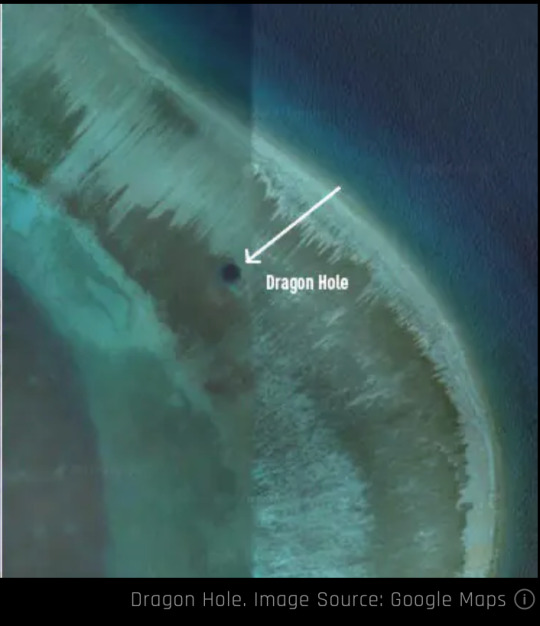
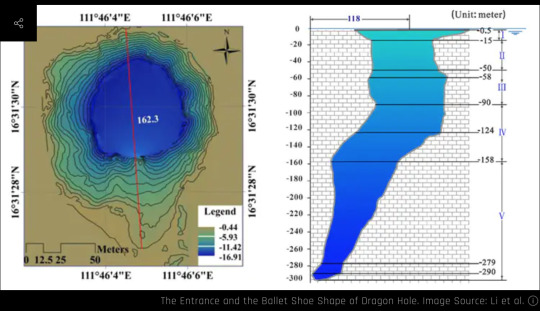
https://www.scientificamerican.com/article/south-china-sea-blue-hole-could-be-world-s-deepest/
#jtjttw submission#geology#chinese mythology#dragon hole#blue holes#dragon palace-ish#ruyi jingu bang#sun wukong#monkey king#dragon king
75 notes
·
View notes
Text

"Monkey head!...I'll never want you as a disciple. If i ever consent to see you again, let me fall into the Avici Hell!"
---
I hope everyone is having fun with the Lady White Bone arc :D
#journey to the west#xiyouji#jttw#jttw reading group#jttw book club#jtjttw submission#sun wukong#monkey king#tang sanzang#tripitaka#lady white bone#body horror
32 notes
·
View notes
Text
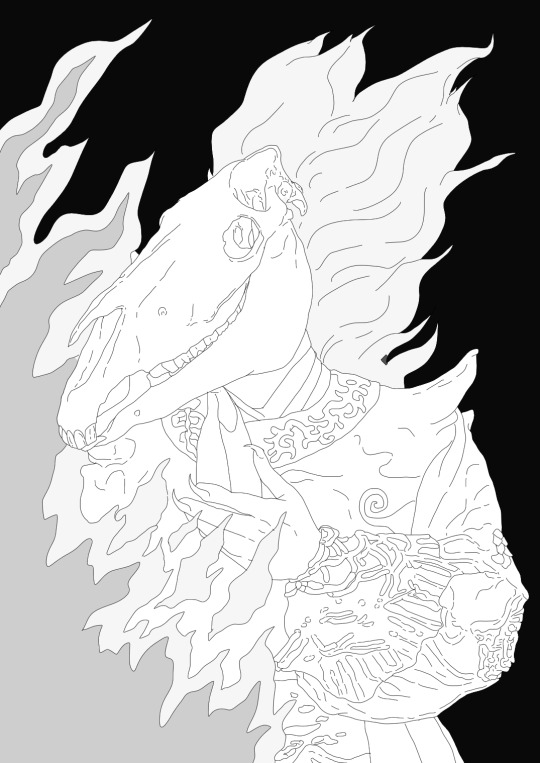
Quick sketch of everyone's favorite White Dragon Horse in honor of this reading group having finally reached his chapter.
#jtjttw submission#bai longma#white dragon horse#xiyouji#journey to the west#jttw#jttw reading group#jttw book club
24 notes
·
View notes
Text
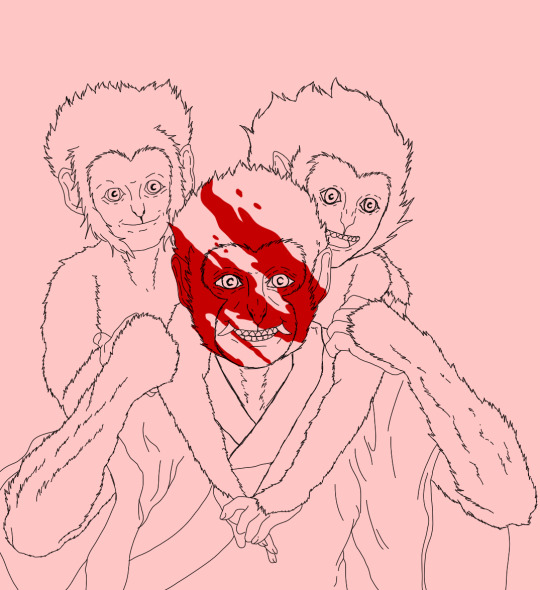
"It's okay, little ones. We can go home."
Sketch in celebration of finishing Chapter 2. Very glad that we've gotten to the place in the story where Sun Wukong became the official communal murder grandpa of Mt. Huaguoshan.
37 notes
·
View notes
Text
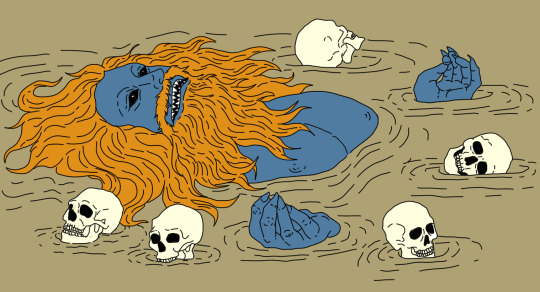
A quick sketch of everyone's favorite sand monk looking strikingly like a famous woman of a different body of water, if with very different accoutrements.
44 notes
·
View notes
Text
Chapter 15 Recap: At Serpent Coil Mountain, the gods give secret protection; At Eagle Grief Stream, the Horse of the Will is reined
Traveling together for several days “under the frigid sky of midwinter” (and likely with frigid conversation, if any, given the events of the last chapter), Tang Sanzang and Sun Wukong eventually reach Serpent Coil Mountain and its Eagle Grief Stream. While master and disciple are looking at the stream, a dragon suddenly emerges and makes straight for the priest. Sun Wukong immediately springs into action, and throws away the luggage, hauls Tang Sanzang off the horse, and “turned to flee with him at once.” The escape too quickly for the dragon to catch up, so it satisfies itself with swallowing the white horse, harness and all, in one gulp before heading back into the stream. Sun Wukong is thus only able to bring back the luggage before trying to use his “fiery eyes and diamond pupils” in an attempt to locate the horse, but concludes that the dragon ate it. Tang Sanzang starts crying at the news, and Sun Wukong yells at him to first “stop behaving like a namby-pamby” and then accuses him of being “truly a weakling” because the monk is afraid that if Sun Wukong leaves him to confront the dragon then there will be no one to protect him. All this angry shouting ends when a “band of deities sent by the Bodhisattva Guanyin to give secret protection to the scripture pilgrim” make themselves known. So with his protection assured, Tripitaka tells Sun Wukong to be careful in facing the dragon, and old monkey is off.
After exchanging some insults and blows, the dragon is forced to retreat back into the water, and no amount of insults Sun Wukong hurls at him will draw him out. In this stalemate, the Monkey King returns to Tang Sanzang to update him on the matter, to which the monk asks the monkey why he can’t seem to “tame dragons” as he had boasted. And as “the monkey had a rather low tolerance for any kind of provocation, this single taunt of Tripitaka so aroused him” that the Monkey King went straight back to Eagle Grief Stream and, using “his magic of overturning seas and rivers,” creates so many strong currents that the dragon is tossed about. Realizing who’s behind this, the dragon comes back out of the water and again wages a “bitter struggle” with Sun Wukong. Yet this time they fight but a few rounds before “the little dragon just could not hold out any longer; shaking his body, he changed himself into a tiny water snake and wriggled into the marshes,” hiding himself so well that not even old monkey could find him.
An increasingly exasperated Monkey King recites a spell to summon the local spirit and the mountain god and threatens to beat them both to blow off some steam. After begging him not to, these deities inform Sun Wukong on how the Bodhisattva Guanyin had rescued the dragon and sent him to Eagle Grief Stream to wait for the scripture pilgrim. These local deities also recommend that the Monkey King ask Guanshiyin to make an appearance, for the dragon would assuredly surrender with her present. One of the gods guarding Tripitaka, the Golden-Headed Guardian, volunteers to request her presence after Sun Wukong returns. Arriving at the Potalaka Mountain where Bodhisattva Guanyin resides, he makes his request and first gets the dragon’s backstory:
“That creature was originally the son of Aorun of the Western Ocean. Because in his carelessness he set fire to the palace and destroyed the luminous pearls hanging there, his father accused him of subversion, and he was condemned to die by the Heavenly Tribunal. It was I who personally sought pardon from the Jade Emperor for him, so that he might serve as a means of transportation for the Tang Monk.”
The Bodhisattva and the Guardian then travel together to Serpent Coil Mountain, where Guanyin is subsequently yelled at by Sun Wukong for using “your tricks to harm me.” She responds by calling the Monkey King an “impudent stableman, ignorant red-buttocks,” and that as he is “neither attentive to admonition nor willing to seek the fruit of truth,” if it wasn’t for the fillet now rooted to his head then he’d “probably mock the authority of Heaven again without regard for good or ill.” Sun Wukong accepts this state of affairs as his “hard luck,” and learns that the bodhisattva had commanded the dragon to that specific pool to await the scripture pilgrim because “only a dragon-horse” could make the journey west. This party then goes to the edge of the stream and requests that the “Third Prince Jade Dragon of the Dragon King Aorun” come out, for the Bodhisattva of the South Sea is now present.
Upon hearing this cry, the “little dragon appeared and changed at once into the form of a man.” He thanks the bodhisattva for saving his life, and then informs her that Sun Wukong “never mentioned a word about scripture seeking.” The Bodhisattva Guanyin admonishes the Monkey King, and tells him that in the future he should “mention first the matter of scripture seeking,” as there are “others who will join you.” Sun Wukong “received this word of counsel amiably,” and the Bodhisattva changes the dragon into a horse that is almost an identical twin of the one he ate. She also tells the dragon that he “must overcome with utmost diligence all the cursed barriers. When your merit is achieved, you will no longer be an ordinary dragon; you will acquire the true fruit of a golden body.” She then moves to take her leave, only for Sun Wukong to grab her and refuse to let go, insisting that the “road to the West is so treacherous” that even he “may well lose my life.” After some more light admonishment, Bodhisattva Guanyin assures the monkey that if he “should come across any danger that threatens your life, I give your permission to call on Heaven…to call on earth…Inn the event of extreme difficulty, I myself will come to rescue you.” She also grants the Monkey King three magic hairs that he can use “according to your needs” should he find himself in “a helpless and hopeless situation.” Sun Wukong thanks her for all of this, and Bodhisattva Guayin returns to Potalaka.
The Monkey King returns to Tang Sanzang with their new dragon-horse in tow, and the now trio are soon off. They travel for some time before they reach the Lishe Shrine. Tripitaka and Sun Wukong are treated to a vegetarian meal and are promised a place to stay for the night, a bit of peace that’s almost ruined by the Monkey King stealing the shrine guardian’s clothesline to tie up the dragon-horse. Yet this leads them to the good fortune of the guardian revealing that he has riding accoutrements that would be exactly what they need.
The next morning the shrine guardian returns with his riding gear, and Sun Wukong is “secretly pleased” but what high quality items they are. Furnished once again with a horse and a saddle, Tripitaka is in the midst of thanking his host for his generosity before the man vanishes, revealing himself to be the local spirit of Potalaka Mountain. This chapter ends with the group traveling on again for a few months until they come across another building, possibly a monastery.
What trials may await them there is a question that will be answered in the next chapter.
#jtjttw submission#jtjttw chapter recap#xiyouji#journey to the west#jttw#jttw reading group#jttw book club#sun wukong#monkey king#tang sanzang#tripitaka#bai longma#white dragon horse#bodhisattva guanyin
11 notes
·
View notes
Text
Chapter Recap 2: Fully awoke to Bodhi’s wondrous truths; He cuts off Mara, returns to the root, and joins Primal Spirit.
Thank you very much to everyone for an interesting second “meeting!” But now the day has drawn to an end, which means it is time for another chapter recap. And so without further ado:
While not covering as long a time period as Chapter 1, Chapter 2 goes over a particularly important part of Sun Wukong’s life. For here we see him, after receiving his religious name, begin his schooling in Daoism. During this time he learns etiquette, “the arts of language,” calligraphy, philosophical discussion, as well as does chores such as planting flowers and fetching water. The Monkey King does this for six or seven years, until one day, being unable to “refrain from dancing on all fours” because he was so delighted by the words of his shifu, Patriarch Subodhi first scolds the monkey and then tells him he will instruct the simian on whatever Daoist tradition the monkey would like. After QUITE a bit of backing and forthing between teacher and student with Sun Wukong rejecting each one as they won’t grant immortality, Patriarch Subodhi finally acts like he’s had enough of the “mischievous monkey,” striking Sun Wukong on the head three times, and then folding his arms behind his back and walking inside. The other students berate Sun Wukong for upsetting their shifu, but the monkey had “already solved secretly, as it were, the riddle in the pot”; that “the master, by hitting him three times, was telling him to prepare himself for the third watch; and by folding his arms behind his back, walking inside, and closing the main doors, was telling him to enter by the back door so that he might receive instruction in secret.”
Sun Wukong makes his way to Patriarch Subodhi’s chambers at the appointed time. The immortal, “terribly pleased” that his pupil understood the riddle and being assured that “‘There is no third party here save your pupil’” (which one later chapter may give us reason to not believe), teaches the monkey “‘the wondrous way of long life.’” Thus was “the very origin…disclosed to Wukong, whose mind became spiritualized as blessedness came to him.’”
After three years quickly go by, Patriarch Subodhi again inquires after Sun Wukong, and learns that the monkey “‘has begun to apprehend the nature of all things.’” Yet what his achievement of immortality and a form of invulnerability means, as Patriarch Subodhi informs Sun Wukong, is that the monkey will need to “‘guard against the danger of three calamities’” of heaven-sent thunder, fire, and wind, which all seem to be there to “correct” the existences of those who “have stolen the creative powers of Heaven and Earth and invaded the dark mysteries of the sun and moon.’” It is for this reason that Patriarch Subodhi teaches Sun Wukong the seventy-two transformations as well as his cloud-somersault. With these techniques mastered, the Monkey King then had “complete freedom, blissfully enjoying his state of long life.”
Sun Wukong continues to live happily as Patriarch Subodhi’s temple until one day when, eager to impress his fellow students at their encouragement, he turns himself into a pine tree. The students’ clapping and laughter soon brings their shifu storming in, demanding to know who’s behind the ruckus. While the students all say that they were the ones being noisy, the patriarch dismisses them all before laying into Sun Wukong for “‘showing off’” and potentially even “‘placing your life in grave jeopardy’” if others demand where he got these abilities. The monkey begs forgiveness, only for Patriarch Subodhi to tell him that while he won’t condemn his simian pupil, Sun Wukong must leave and go back home to Mt. Huaguoshan. He further tells the monkey that he’s “‘bound to end up evildoing,’” and that while he doesn’t care “‘what kind of villainy and violence you engage in…I forbid you ever to mention that you are my disciple. For if you but utter half the word, I’ll know about it; you can be assured, wretched monkey, that you’ll be skinned alive. I will break all your bones and banish your soul to the Place of Ninefold Darkness, from which you will not be released even after ten thousand afflictions!’” Having no other choice, and having thanked his shifu, Sun Wukong uses his cloud-somersault to quickly go back to Flower-Fruit Mountain.
Rejoicing to be back home, Sun Wukong is soon greeted by the other monkeys, who both chide him for being gone so long as well as tell him how they are being “brutally abused by a monster…that fellow has plundered many of our possessions, kidnapped a number of our young ones, and given us many restless days and nights watching over our property.” Enraged by this news, the Monkey King declares he will “‘exact vengeance’” on this Monstrous King of Havoc, and flies off to confront him. Declaring himself the lord of the Water-Curtain Cave, Sun Wukong offers a challenge to the gigantic monster and is mocked for it before the two swiftly come to blows. It is here that we then see Sun Wukong use one of his most infamous techniques, “the method called Body beyond the Body. Plucking a handful of hairs from his own body and throwing them into his mouth, he chewed them to tiny pieces and then spat them into the air. ‘Change!’ he cried, and they changed at once into two or three hundred little monkeys encircling the combatants on all sides. For you see, when someone acquires the body of an immortal, he can project his spirit, change his form, and perform all kinds of wonders.” With this technique, Sun Wukong is able to swiftly overwhelm the Monstrous King of Havoc, even killing the yaoguai with his own scimitar. This one-monkey army then slaughters “all of the imps, young and old,” frees “the little monkeys kidnapped by the Monstrous King from the Water-Curtain Cave,” and “set fire to the Water-Belly Cave and reduced it to ashes.”
The Mt. Huaguoshan monkeys are left in “great delight” and seeing their young ones returned, the entire troop then welcoming Sun Wukong back with a banquet. Besides giving them a summary of how he gained his magic powers, the Monkey King also lets his “little ones” know that “‘another delight is that our entire family now has a name…When the monkeys heard this, they all clapped their hands and shouted happily, ‘If the great king is Elder Sun, then we are all Junior Suns, Suns the Third, small Suns, tiny Suns—the Sun Family, the Sun Nation, and the Sun Cave!’ So they all came and honored Elder Sun with large and small bowls of coconut and grape wine, of divine flowers and fruits. It was indeed one big happy family!”
We will have to wait for the next chapter to see if this monkey family is able to keep their happiness.
#jtjttw submission#jttw chapter recap#xiyouji#journey to the west#jttw#sun wukong#monkey king#patriarch subodhi#water-curtain cave#mt. huaguoshan
18 notes
·
View notes
Text
Chapter Seventeen Recap: Pilgrim Sun greatly disturbs the Black Wind Mountain; Guanshiyin brings to submission the bear monster
Somersaulting into the air to ride the clouds to the yaoguai’s lair, Sun Wukong leaves all the assembled monks shaking in terror and exclaiming over how he must be “an incarnate deity.” Tang Sanzang sends them into a further panic when he says that if the Monkey King isn’t able to retrieve the cassock that he “would fear for your lives; for that disciple of mine has a bad temper, and I’m afraid that none of you will escape him.”
For his own part, Sun Wukong swiftly arrives at the Black Wind Mountain, and finds it a magnificent place. He’s able to enjoy the spring scenery for only a short time until he hears voices and, sneaking over, sees three assembled yaoguai having an animated conversation on “the esoteric doctrines of heterodox Daoism.” One of them—the same yaoguai that snatched the cassock, tells the other two that tomorrow is his birthday and that he plans to wear it while hosting a feast in grand style. “Unable to suppress his anger” upon hearing this, Sun Wukong leaps out of his hiding place and demands the cassock be returned before he attempts to hit their heads with his as-you-will cudgel. Two yaoguai escape but the Monkey King does manage to kill one, which turns out to be “the spirit of a white-spotted snake.” After breaking this snake’s body into several pieces, Sun Wukong travels on until he finds the Black Wind Cave, where the cassock-stealing yaoguai lives. The Monkey King bangs on the door and yells at a little yaoguai to go tell its king to return the cassock immediately if they want Sun Wukong to spare their lives. Yet the king of this cave, the Black Wind King, dons his armor and, after the two exchange insults (and Sun Wukong recites a poem about his history and his greatness to which the Black Wind King just laughs and calls him a BanHorsePlague) they battle.
The yaoguai are equally matched, and fight for ten rounds to a draw. The Black Wind King then tells Sun Wukong that he wants to break for lunch, after which they can resume their brawl. The Monkey King responds by yelling at the Black Wind King that all he has to do is return the cassock, but the other yaoguai flees into his cave and shuts the stone doors tight behind him. He then made preparations for a banquet, including “writing out invitation cards to the monster kings of various mountains.” Sun Wukong, unable to break down the cave door, decides to return to the monastery. There he finds Tang Sanzang being waited on hand and foot, and reports that while he discovered “the real culprit” of the cassock’s theft, the monks aren’t safe yet as the cassock hasn’t been returned and Pilgrim Sun has to check to make sure they’ve been taking the best of care of his shifu and their dragon horse. Tripitaka assures the monkey that the monks “didn’t dare slight me.” Sun Wukong then has his own snack break and leaves again in quest of the cassock.
As he’s traveling back to the Black Wind Cave, the Monkey King spots a little yaoguai traveling along with a box. “Suspecting that something important was inside the box,” Sun Wukong reduces the other yaoguai to “a meat patty,” tosses these remains to the side of the road, and then finds that the box contained an invitation addressed to none other but the now-deceased abbot of the recently destroyed monastery (whose name is revealed to be Golden Pool) inviting him to the festival for the Black Wind King’s birthday and in celebration of the cassock. Believing this a wonderful opportunity, Sun Wukong shapeshifts himself into “an exact semblance of that old monk.” He rapidly travels to the Black Wind Cave, but while he does fool all the other yaoguai, the Black Wind King’s suspicion is aroused because there’s no way the old monk could have traveled so quickly. He thus orders the cassock to be hidden, but still greets “the abbot” as if they were old friends.
The two drink tea together, after which the Black Wind King inquires how “Golden Pool” answered his invitation so quickly. The two verbally feint back and forth until one of the little yaoguai rushes in and reports Sun Wukong’s murder and trickery. The Black Wind King and the Monkey King, now assuming his original form, proceed to fight throughout the cave, terrifying the other yaoguai. They continue to fight out of the entrance of the Black Wind Cave and to the very peak of the mountain, where, “Belching wind and fog, kicking up sand and rocks, they fought until the red sun sank towards the west, but neither of them could gain the upper hand.” Finally the Black Wind King calls time-out so that he can sleep, and escapes Sun Wukong’s blows by changing himself a clear breeze, traveling back to his cave, and locking its doors securely.
Again having “no alternative except to go back to the Guanyin Hall,” Sun Wukong gives his most recent report to Tripitaka, as well as assures Tang Sanzang that though their previous abbot was friends with a yaoguai, none of the other monks “have the aura of monsters.” He further concludes that the Black Wind King is “a black bear who has become a spirit.” Sun Wukong also informs Tang Sanzang that an animal becoming a spirit is no surprise, for “Old Monkey is also a beast…but I became the Great Sage, Equal to Heaven…All the creatures of this world who possess the nine apertures can become immortals through the art of self-cultivation.” Sun Wukong’s good humor quickly turns sour when Tripitaka starts doubting that he can retrieve the cassock. They do, however, partake in an evening meal before spending the night in the Chan hall.
As soon as the sun rises on the next morning, Tripitaka enjoins Sun Wukong to “Go find the cassock quickly.” Sun Wukong instructs the other monks to “take care to minister to my master,” and then states that, as “this whole affair reveals the irresponsibility of the Bodhisattva Guanyin,” he plans to travel to the South Sea “to find her for a little conversation. I’m going to ask her to come here and demand that the monster return the cassock to us.” The Monkey King then rapidly travels to the Potalaka of the South Sea where Guanyin resides, and is met by various deities who ask him, given that he’s “supposed to be accompanying the Tang Monk at this moment,” how he has the time to visit. Sun Wukong merely says that he needs to see the Bodhisattva, and, once invited in by Guanyin, engages her in a bout of verbal sparring over who’s to blame for the theft of the cassock. It ends with the monkey bowing “with humility” to the Bodhisattva and begging her to help him deal with this monster, who’s magical power is “really just as strong” as his. Guanyin agrees to do so “for the sake of the Tang Monk.”
The two immortals “mounted the blessed clouds and soon arrived on the Black Wind Mountain,” where Sun Wukong almost immediately kills “a Daoist coming down the mountain slope, holding a glass tray on which there were two magic pills.” The Monkey King just as quickly assuages a horrified Guanyin by telling her that this Daoist, which is soon revealed to have been a gray wolf, was “a friend of the Black Bear Spirit,” and that he was likely on his way “to celebrate his friend’s birthday.” Sun Wukong further finds the tray with its pills to be some luck that will let him and Guanyin meet plot with plot. He suggests that Guanyin takes on the form of the wolf Daoist—known as Master Transcending Void—while he turns into one of the pills. Once the Black Wind King swallows that pill, “old Monkey will accomplish the rest. If he is unwilling to return the Buddha robe, old Monkey will make one—even if I have to weave it with his guts!”
Finding this to indeed be the best course of action, Guanyin “changed into the form of the immortal Master Transcending Void,” remarking upon Sun Wukong’s question “Is the monster the Bodhisattva, or is the Bodhisattva the monster?” that “the Bodhisattva and the monster—they both exist in a single thought. Considered in terms of their origin, they are all nothing.” “Instantly enlightened,” the Monkey King “changed at once into a magic pill,” and the two set off.
Boddhisatva Guanyin finds the Black Wind Cave so pleasing that she wonders that “If this cursed beast could occupy such a mountain, it might be that he is destined to attain the Way.” Some little yaoguai see her and announce the arrival of “Immortal Transcending Void,” and soon enough the disguised Bodhisattva presents the “pill” to the Black Wind King. No sooner has the yaoguai monarch swallowed it than Sun Wukong “changed back into [his] original form and began to do physical exercises!” Leaving the monster stricken on the ground, Boddhisatva Guanyin recovers the cassock, and the Monkey King leaves the monster’s body through his nose. Yet “fearing that the monster might still be truculent, the Bodhisattva threw a fillet on his head.” Sure enough, no sooner had the Black Wind King recovered that he thrusts his lance at Sun Wukong. And so Guanyin recites the band-tightening spell, and the bear yaoguai is left rolling “wildly all over the ground” in “excruciating pain” while “the Handsome Monkey King nearly collapsed with laughter.”
Seeing that the Black Wind King had almost “rolled himself to death on the ground,” the Boddhisatva demands and accepts his surrender. She also prevents Sun Wukong from killing the other yaoguai, as “There’s no one guarding the rear of my Potalaka Mountain…and I want to take him back there to be a Great Mountain-Guardian God.” Sun Wukong states that she’s “Truly a salvific and merciful goddess…who will not hurt a single sentient being. If old Monkey knew a spell like that, he’d recite it a thousand times. That would finish off as many black bears as there are around here!” The bear yaoguai, for his own part, is “convinced by the unbearable pain,” and “had no choice but to fall on his knees and beg” for mercy. Guanyin “gave him the commandments, telling him to wait on her,” and instructs Sun Wukong to “serve the Tang Monk attentively. Don’t start any more trouble with your carelessness.” The Monkey King thanks the Bodhisattva for her help, and the immortals part, Guanyin with the bear to the South Sea, and Sun Wukong to Tang Sanzang, cassock in tow. Thus ends the first of many battles with other yaoguai.
10 notes
·
View notes
Text
Well, we're far from the end of Sunday--and while this is very Americanized and dealing with a very different reason for sorrow--it seems that many of today's submitters would agree that this is one of Tang Sanzang's theme songs:
youtube
#xiyouji#journey to the west#jttw#tang sanzang#jtjttw submission#jttw reading group#jttw book club#Youtube
12 notes
·
View notes
Text
Chapter 3 Recap: Four Seas and a Thousand Mountains all bow to submit; From Ninefold Darkness ten species’ names are removed
We are now not very far into the story, but Chapter Three has given us some of Sun Wukong’s most (in)famous acts in very rapid succession! We begin with an account of how the Monkey King turned the Mt. Huaguoshan troop into a proper army and “practiced daily with the little monkeys the art of war.” Yet after some time Sun Wukong becomes disturbed at the thought that the bamboo spears and wooden swords the monkeys were armed with wouldn’t stand a chance against actual “sharp swords and fine halberds,” something that leaves all the monkeys alarmed and wondering where they might get such things. At this, four older members of the troop, “two female monkeys with red buttocks and two bareback gibbons,” come forward to tell the “Great King” he should get such weapons from the king of the Aolai Country, “who has numberless men and soldiers in his city, and there are bound to be all kinds of metalworks there.” Delighted at this idea and making the trip of two hundred miles to Aolai Country in no time at all, Sun Wukong uses his magic to steal the entire armory. And so the Mt. Huaguoshan troop, who are forty-seven thousand strong, became very well armed indeed!
Impressed by the assembly of well-armed and well-trained monkeys, the yaoguai kings of seventy-two caves all come to pay homage to the Monkey King, and even start bringing him annual tributes and joining his army. In this manner Mt. Huaguoshan becomes “as strong as an iron bucket or a city of metal.” Yet while the Monkey King does enjoy the ever-growing impregnability of his beloved mountain home and the strength gathered by his beloved family, he becomes deeply unsatisfied with the scimitar he took from the Monstrous King of Havoc. Coming forward again, the four elder monkeys suggest that he use his vast magical powers to visit the Dragon King of the Easter Ocean, and there request a new weapon. Sun Wukong is quick to make the trip, and is greeted with honor by the Dragon King Aoguang. The Dragon King then offers the Monkey King one weapon after another, each of which Sun Wukong rejects for being “too light.” Aoguang is left “completely unnerved” at witnessing how the monkey easily wields even a halberd weighing seven thousand two hundred pounds, and even though he protests that he has nothing heavier to offer Sun Wukong, the monkey insists he look some more, stating that he’ll give the dragon a “good price” for an acceptable weapon.
It is here that the dragon mother and her daughter suggest Aoguang show the Monkey King “that piece of rare magic iron by which the depth of the Heavenly River is fixed,” hoping that one way or another offering it to Sun Wukong will get the monkey off their collective back. Yet to everyone’s surprise, the Monkey King is able to lift this pole using all his might, and to his pleasure discovers that this metal responds to his request to become shorter and thinner at his command. When he finally gets it to the size he wants, he examines it and “found a golden hoop at each end, with solid black iron in between. Immediately adjacent to one of the hoops was the inscription, ‘The Compliant Golden-Hooped Rod. Weight: thirteen thousand five hundred pounds.” And so the Monkey King is now armed with his famous staff.
Aoguang and all his subjects are left shaking in fear seeing how Sun Wukong displayed his might as he mock fought with the staff throughout their court. They are left more fearful still when the monkey proclaims he must also have the “material apparel” to go with his new weapon, even threatening to “try the iron” on the Dragon King if he doesn’t give him something suitable. Aoguang is forced to summon his three brothers Aoqin, Aoshun, and Aorun, each of them also a dragon king of an ocean, in the hopes they might have what the simian wants. They are left outraged at the monkey’s audacity and theft, but ultimately decide that, as it would be suicidal to go against the Monkey King armed with his new “piece of iron,” that they will “assemble an outfit for him and get him out of this place. We can then present a formal complaint to Heaven, and Heaven will send its own punishment.” All agree to this plan, and thus give Sun Wukong an outfit composed of “cloud-treading shoes the color of lotus root,” a “cuirass of chain-mail made of yellow gold,” and “a cap with erect phoenix plumes, made of red gold.” Sun Wukong takes his new outfit and his new staff and leaves with a “Sorry to have bothered you!” to the dragons, something that leaves them even more enraged and eager to tell Heaven about the monkey’s misdeeds.
Sun Wukong, for his own part, is left “beaming broadly” at the praise the monkeys heap upon him at seeing his new finery, and gives them a playful demonstration on the extent to which his new weapon can grow and shrink. Soon after he performs “magic of cosmic imitation” and takes on his war form for the first time, a figure “ten thousand feet tall, with a head like the Tai Mountain and a chest like a rugged peak, eyes like lightning and a mouth like a blood bowl, and teeth like swords and halberds. The rod in his hand was of such a size that its top reached the thirty-third Heaven and its bottom the eighteenth layer of Hell.” All the yaoguai and their kings who see this are left terrified, their fear compelling them to continue paying their respects.
At this time, all the assembled yaoguai have a “great banquet of a hundred delicacies,” and “the cups were filled to overflowing.” At this feast the Monkey King “made the four old monkeys mighty commanders of his troops by appointing the two female monkeys with red buttocks as marshals Ma and Liu, and the two bareback gibbons as generals Beng and Ba. The four mighty commanders, moreover, were entrusted with all matters concerning fortification, pitching, camps, reward, and punishment.” This achieved and the absolute security of Mt. Huaguoshan and his family seeming assured, the Monkey King not only proceeds to travel all over the world making good friends wherever he goes, but also “entered into fraternal alliance with six other monarchs: the Bull Monster King, the Dragon Monster King, the Garuda Monster King, the Giant Lynx King, the Macaque King, and the Orangutan King.” For a long time this fraternal order of seven spend their days discussing civil and military arts while not overlooking a single pleasure, from exchanging wine cups to song and dance.
After another banquet at Mt. Huaguoshan some time after the fraternal order is formed and during which everyone becomes “thoroughly drunk,” the Monkey King sinks into a deep slumber only for his soul to be dragged to hell. Yet Sun Wukong fiercely “protests” this, first making the case to his jailers that he shouldn’t be there because he successfully trained to be an immortal, and when that doesn’t work he pulls out his treasure and “reduced [them] to hash.” Sending bull and horse-headed demons fleeing in every direction, the Monkey King fights his way to the Palace of Darkness and demands under pain of “a drubbing” that the Ten Kings of the Underworld bring out the register of birth and death and let him see if his death was a mistake. Sure enough, he finds himself as “Soul 1350…Sun Wukong…Heaven-born Stone Monkey. Age: three hundred and forty-two years. A good end.” Yet good or not, the Monkey King refuses to accept any form of death, instead forcing hell’s judges to get him a brush soaked in heavy ink so that he can cross out his own name and the name of every other monkey on the ledger. This accomplished, Sun Wukong declares that he’s truly no longer the subject of death and fights his way back out of the Region of Darkness. The Ten Kings, for their own part, could do nothing except “report the incident to Heaven.”
Waking and realizing that his escapades in hell were “all a dream,” Sun Wukong, the mighty commanders, the various other monkeys, and soon enough the six sworn brothers nevertheless are all “delighted about the cancellation of the names,” believing that “those fellows,” the ministers of death, “have no hold over us now.” And indeed, “from that time onward there were many mountain monkeys who did not grow old, for their names were not registered in the Underworld.”
Yet even as the yaoguai celebrate, the Great Benevolent Sage of Heaven, the Celestial Jade Emperor of the Most Venerable Deva, is presented with more and more complaints about Sun Wukong’s various crimes and exploits. Hearing about the terror the Monkey King inflicted on the Dragon Kings, the Jade Emperor declares that he will send his generals out to arrest the unruly culprit. Right after, the Jade Emperor also receives the complaint from underworld on how Sun Wukong is upsetting the very wheel of transmigration, “for birth and death are eliminated in each kind of monkey,” and as such there is now another request for the Jade Emperor to “send forth your divine army and subdue this monster.”
The Jade Emperor, now faced with more understanding of the power this monkey holds, asks which of his divine generals will take on the task of capturing Sun Wukong. Yet the Long-Life Spirit of the Planet Venus steps forward and offers an alternative: that the Jade Emperor, instead of going to war with the Monkey King, summon the simian to Heaven and give him “some kind of official duties. His name will be recorded in the Register and we can control him here.” If he obeys then Heaven will gain another immortal, and if he doesn’t than he can be arrested without any military might needed. The Jade Emperor is “highly pleased” at this idea, and delegates the Gold Star of Venus to inform Sun Wukong of this new (and somewhat dubious) honor. The Monkey King receives the Gold Star politely, is delighted at the offer of a place among the deities, and agrees to go to Heaven. This chapter ends with Sun Wukong instructing his four mighty commanders to “Be diligent in teaching and drilling the young ones. Let me go up to Heaven to take a look and see whether I can have you all brought up there too to live with me.”
Whether Heaven will become a monkey paradise or not is a question that will have to wait for the next chapter.
#jtjttw submission#jttw chapter recap#xiyouji#journey to the west#jttw#sun wukong#monkey king#ao guang#the jade emperor#the four mighty commanders
15 notes
·
View notes